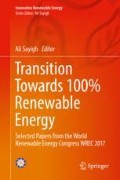Abstract
Around 80% of the world’s economic growth projected from 2004 to 2030 will be contributed by non-OECD (Ellis, Energy service companies in developing countries: Potential and practice. International Institute for Sustainable Development (IISD, 2009).); energy service companies (ESCOs) can play a vital role in improving energy efficiency in developing countries. ESCO can help energy users, customers, companies, industries and commercial sectors to improve an efficiency of equipment by providing energy service (energy performance and/or credit risk). ESCO was implemented quite successfully to promote energy efficiency (EE) in majority of the European Union (EU) and developed countries such as the USA, Canada and Japan but not in many developing countries. This raised the question, what are the potential barriers of using ESCO for EE programmes in developing countries? It is, therefore, crucial to understand the ESCO approach in different countries to find lessons learned and best practices. The policy for implementing ESCO varied in different countries depends on many factors such as the culture, the acceptance of EE and also the level of EE development. Although the same policy of ESCO can be implemented in several countries, the result could be different. This research will provide a comprehensive overview of the success and barriers to implementing ESCO programmes for energy efficiency in the developing countries. The lessons learned from this will summarize with the recommendation to develop ESCO implementation in developing countries.
References
(CCAP), C. f. C. A. P. (2012). Revolving and Esco funds for renewable energy and energy efficiency finance: Thailand. Funding the future: The growing might of financing boosts renewable energy and energy efficiency. Washington, DC 20002, Center for Clean Air Policy (CCAP).
Agency, I. E. (2010). Energy poverty: How to make energy access universal? Special early excerpt of the World Energy Outlook (WEO) 2010 for the UN general assembly on the millennium development goals. Paris, United Nations.
Bertoldi, P., et al. (2006). Energy service companies in European countries: Current status and a strategy to foster their development. Energy Policy, 34(2006), 1818–1832.
Bertoldi, P., et al. (2014). ESCO market report 2013. Luxembourg, European Commission.
Bobbino, S., et al. (2013). Budget-neutral financing to unlock energy savings potential: An analysis of the ESCO model in Barcelona. B. W. P. Series, Basque Centre for Climate Change.
Commission, E. (2016). Energy performance contracting. Retrieved 3 October 2016, 2016, from http://iet.jrc.ec.europa.eu/energyefficiency/european-energy-service-companies/energy-performance-contracting
Da-li, G. (2009). Energy service companies to improve energy efficiency in China: Barriers and removal measures. Procedia Earth and Planetary Science, 2009, 1695–1704.
Dornan, M. (2011). Solar-based rural electrification policy design: The Renewable Energy Service Company (RESCO) model in Fiji. Renewable Energy, 36(2010), 797–803.
Dreessen, T. (2003). Advantages and disadvantages of the two dominant world ESCO models; shared savings and guaranteed savings. Proceedings First Pan-European Conference on Energy Service Companies.
Ellis, J. (2009). Energy service companies in developing countries: Potential and practice. International Institute for Sustainable Development (IISD).
Geller, H., et al. (2006). Polices for increasing energy efficiency: Thirty years of experience in OECD countries. Energy Policy, 34(2006), 556–573.
Hansen, S. J. (2003). Lesson learned around the world. First European Conference on Energy Service Companies (ESCOs): “Creating the Market for the ESCOs Industry in Europe, European Communities.
Hansen, S. J. (2011). ESCOs around the world. Strategic Planning for Energy and the Environment 30(3), 9–15.
IEA. (2015). World energy outlook 2015. 75739 Paris Cedex 15, France, International Energy Agency.
Kenny, C. (2016). Goal 1—end poverty in all its forms everywhere. Retrieved 17 Jan 2017, 2017, from https://unchronicle.un.org/article/goal-1-end-poverty-all-its-forms-everywhere.
Lee, M.-K., et al. (2003). Promoting energy efficiency financing and ESCOs in developing countries: Experiences from Korean ESCO business. Journal of Cleaner Production, 11(2003), 651–657.
Liming, H. (2009). Financing rural renewable energy: A comparison between China and India. Renewable and Sustainable Energy Reviews, 13(2008).
Lipp, J. (2001). Micro-financing solar power the Sri Lankan SEEDS model. Refocus, 2(8), 18–21.
LLC, M. I. (2013). The energy service market 2020.
Lo, K. (2014). A critical review of China’s rapidly developing renewable energy and energy efficiency policies. Renewable and Sustainable Energy Reviews, 29(2014), 508–516.
Marino, A., et al. (2010). Energy service companies market in Europe. Luxembourg: European Commission.
Morgado, D. (2014). Energy service companies and financing. Retrieved Oct 4, 2016, from https://www.iea.org/media/training/presentations/latinamerica2014/8A_Energy_Service_Companies_and_Financing.pdf
Murakoshi, C., & Nakagami, H. (2009). Current state of ESCO activities in Asia: ESCO industry development programs and future tasks in Asian countries.
Okay, N., & Akman, U. (2010). Analysis of ESCO activities using country indicators. Renewable and Sustainable Energy Reviews, 14(2010), 2760–2771.
Osborn, J., et al. (2002). Assessing U.S. ESCO industry: Results from the NAESCO database project. Berkeley, Ernest Orlando Lawrence Berkeley National Laboratory.
Seefeldt, F., et al. (2013). Marktanalyse Und Marktbewertung Sowie Erstellung Eines Konzeptes Zur Marktbeobachtung Für Ausgewählte Dienstleistungen Im Bereich Energieeffizienz. Berlin: Prognos.
Taylor, R. P., et al. (2008). Financing energy efficiency: Lessons from Brazil, China, India, and beyond. The International Bank for Reconstruction and Development, The World Bank, Washington DC.
Urmee, T., et al. (2009). Issues related to rural electrification using renewable energy in developing countries of Asia and Pacific. Renewable Energy, 34(2009), 354–357.
Vine, E. (2005). An international survey of the energy service company (ESCO) industry. Energy Policy, 33(2005), 691–704.
WorldBank. (2016). Fostering the development of eSCo markets for energy efficiency. Retrieved 1 Oct 2016, 2016, from http://documents.worldbank.org/curated/en/709221467753465653/pdf/103932-BRI-LW54-OKR-PUBLIC.pdf
Wu, J. (2015). Goal 7—ensure access to affordable, reliable, sustainable and modern energy for all. Retrieved 13 Jan 2017, 2016, from https://unchronicle.un.org/article/goal-7-ensure-access-affordable-reliable-sustainable-and-modern-energy-all
Author information
Authors and Affiliations
Corresponding author
Editor information
Editors and Affiliations
Rights and permissions
Copyright information
© 2018 Springer International Publishing AG
About this chapter
Cite this chapter
Nurcahyanto, Urmee, T. (2018). Development of Energy Service Company (ESCO) Market to Promote Energy Efficiency Programmes in Developing Countries. In: Sayigh, A. (eds) Transition Towards 100% Renewable Energy. Innovative Renewable Energy. Springer, Cham. https://doi.org/10.1007/978-3-319-69844-1_26
Download citation
DOI: https://doi.org/10.1007/978-3-319-69844-1_26
Published:
Publisher Name: Springer, Cham
Print ISBN: 978-3-319-69843-4
Online ISBN: 978-3-319-69844-1
eBook Packages: EnergyEnergy (R0)

